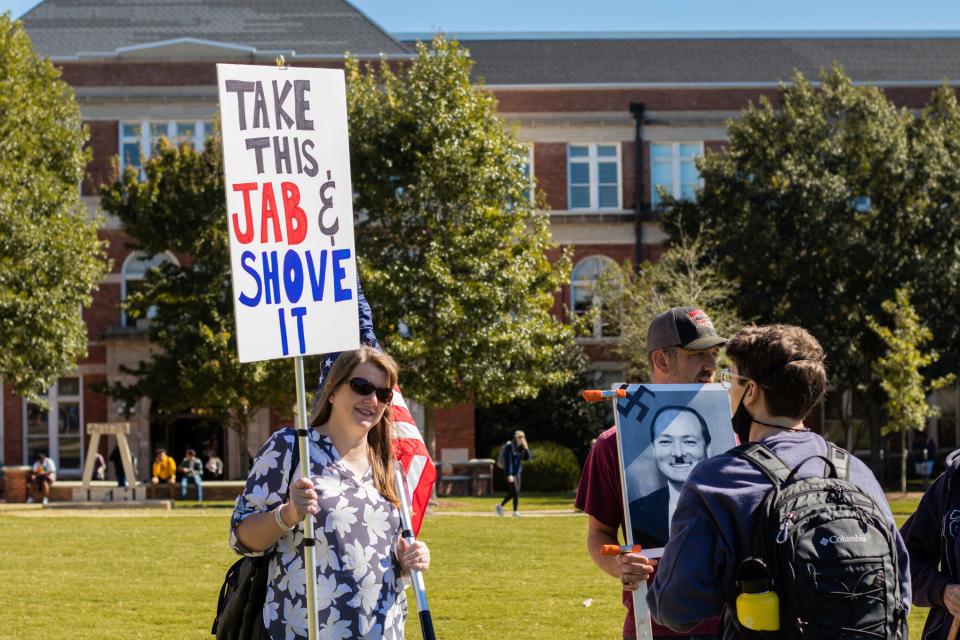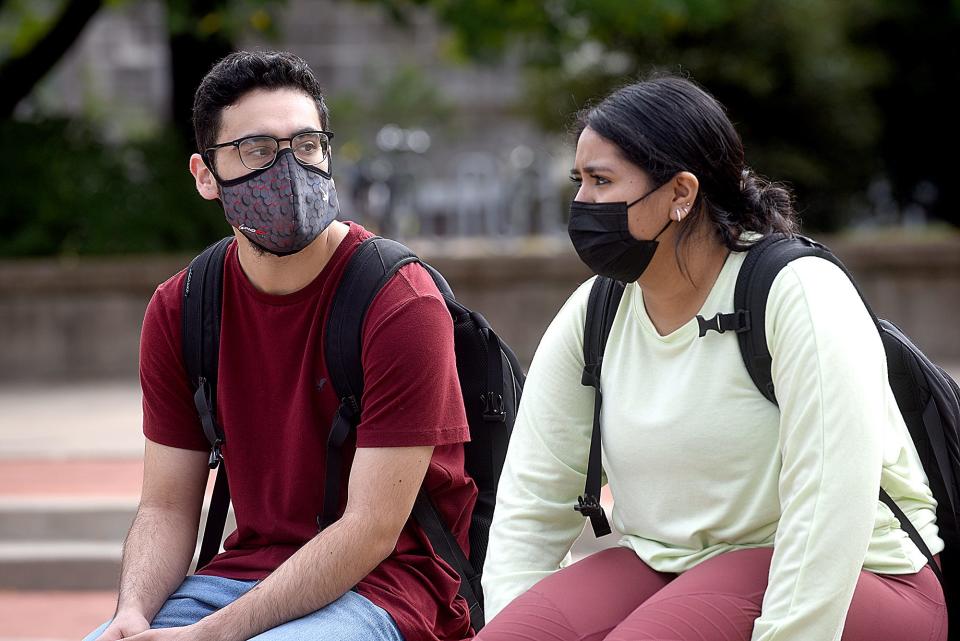These red-state colleges won't mandate COVID-19 vaccine for students – but they will for employees
A fresh batch of universities, some of them reluctantly, are rolling out COVID-19 vaccine mandates – this time for university employees.
But the polarization among college campuses continues: Even as some colleges are expanding vaccine mandates, others are allowing their mask requirements to expire.
The expanded vaccine rules are linked to the government’s requirement that its contractors be vaccinated or risk losing federal money. Many, although not all, universities receive federal money to conduct research.
Citing the federal order, colleges in states such as Arizona, Alabama and Mississippi have required their employees to be vaccinated, even after their local leaders opposed and sometimes outlawed such mandates. Universities in states such as Georgia, Missouri, or Tennessee are interpreting the federal order more selectively.
The federal government's deadline to comply with the vaccine requirement had been Dec. 8, but it extended that window through Jan. 4. The announcement came on Thursday, the same day that the federal government introduced new rules requiring that employees of large, private businesses be vaccinated or submit to regular coronavirus screenings.
Q&A: 20 questions, answers on the new COVID-19 vaccine rules for workers
The federal contractor mandate allows exemptions for religious or medical reasons, and so will the universities adopting the new orders.
Since it can take up to six weeks to be considered fully vaccinated, some universities had started announcing their policies in October to give their employees time to comply.
Others, such as the University of Missouri, say they’re still considering whether and how the mandate applies to them. In the meantime, that university recently allowed its masking requirement to expire. It’s now asking people on campus to wear masks indoors rather than mandating their usage.
How does COVID-19 affect me? Don’t miss an update with the Coronavirus Watch newsletter.
At many colleges, efforts to require vaccinations on campus had been focused on undergraduates, because they tend to live in close quarters and have more active social lives. What's more, universities have long required students to be vaccinated against diseases such as measles or meningitis. About 1,100 universities have some type of COVID-19 vaccine requirement for students or employees, according to the Chronicle of Higher Education.
The federal order is focused on university employees, but it will inevitably include some students who work for their colleges, said James Hodge, a professor of law at Arizona State University, which recently required its employees to be vaccinated.
The shift also illustrates the competing demands public universities face in trying to balance the politics of their local leaders – who can influence how much money they receive – and the national laws they’re required to follow.
“You can’t comply with a federal contractor mandate and also adhere to a state law that says you can’t take these vaccines,” Hodge said. “State law loses, and that’s how it works.”
In Mississippi, is $271M worth a vaccine mandate?
Earlier this year, the board of trustees that oversees public colleges in Mississippi voted to ban vaccine mandates on its campuses. The order was noteworthy because previous prohibitions on vaccine mandates had come from local governments, not the colleges' oversight bodies themselves.

Part of that board’s ban still applies to students who aren’t employed by the university, but employees who remain unvaccinated will have to comply with the new federal order. In its announcement about the new requirement, the Mississippi board said it “does not support the federally imposed COVID-19 mandate,” but does support exemptions for medical and religious beliefs.
The board had debated whether it was necessary to change course and require the vaccine, and some members had suggested leaving it to the individual universities to comply with the federal mandate. But one trustee had a simpler interpretation of what was at stake.
“If you want federal money via federal grants, you have got to comply,” said trustee Dr. Alfred E. McNair, a gastroenterologist on the board since 2015. “If you all want to come up with $271 million, I guess it’s OK. We don’t have to worry about it.”
Biden vaccine mandates are looming: Protests for personal freedoms are swelling. What happens next?
Ultimately, nine of the members of the board voted to require the vaccine in order to hold onto the federal contracts with universities within the system.
Even so, at least two of the nine universities in the system have said they believe the rule does not apply to them and will forgo a mandate.
New mandate confuses, but gets more vaccinations
Two of Georgia's largest colleges, the University of Georgia and Georgia Tech, also rolled out vaccine requirements for employees working on or tied to federal contracts, but faculty members at smaller institutions in the state still wonder if or when the rules will apply to them.
Matthew Boedy is a professor of rhetoric at the University of North Georgia who has advocated for more stringent COVID-19 precautions on campus. His college's administration said the campus wouldn’t have to adopt the vaccine mandate. But he's fielding questions from confused professors around the state as part of his role as a local leader of the American Association of University Professors union.
He doesn’t blame the federal government for the confusion.
“They’re trying to get more people vaccinated,” Boedy said. “The limited interpretation by the university system is causing more confusion.”
'Like our employer doesn't have our back'
Several public institutions still have no COVID-19 vaccine requirements, and some have even rolled back their mask mandates, to the dismay of some students.
The University of Missouri’s mask mandate expired Oct. 15, and the institution opted to let it lapse. In its place, the university said it will ask everyone, regardless of their vaccination status, to wear masks indoors. It mentioned its vaccination rate and a decrease in COVID-19 on campus as justification for the change.

As of Tuesday, that university also hadn’t announced whether it would institute a vaccine mandate to comply with the federal requirement. Christian Basi, a spokesman for the university, said leaders were still reviewing the mandate to “determine how or if it will affect us.”
The mask walk-back was protested by many on campus, including the local chapter of the Coalition of Graduate Workers. Mike Olson, a member of the group, said he was especially disheartened given the prominent graduate students have in teaching undergraduates.
Grad students are continuing to protest, he said, even though he is not optimistic about changing the administration’s stance. It’s embarrassing, he said, in light of other safety precautions adopted by other universities.
“We feel like our employer does not have our back,” Olson said. “What Mizzou is doing is throwing up its hands and saying, 'We’re done with it.'"
Olson said the group was now pushing the university to institute a vaccine mandate. The University of Alabama is also rolling back its masking guidance, though it requires its employees to be vaccinated.
Other conservative states have indicated they plan to push back against Biden’s order. Just last week, Georgia Gov. Brian Kemp sued the federal government, as did Florida Gov. Ron DeSantis. And a group of 10 states, led by Missouri Attorney General Eric Schmitt, made a similar effort to block the mandate.
In the meantime, universities are still moving forward. The University of Florida, which hadn’t required vaccines for most of the mandate, announced Oct. 28 that it too would require its eligible employees to get vaccinated.
Vaccine mandates and COVID testing — or neither? Colleges test the limits of ‘normal’ fall
This article originally appeared on USA TODAY: Colleges mandate COVID-19 vaccine for employees, but not students

